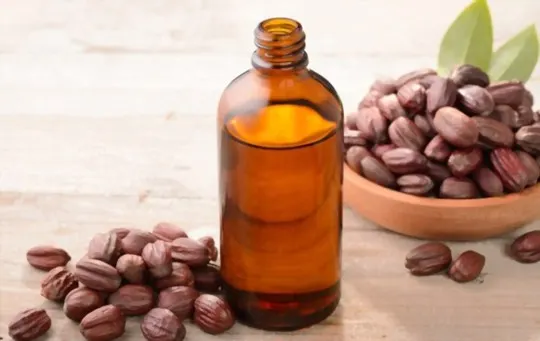Do you often find yourself wondering if jojoba oil lasts long enough to be used for an extended duration of time?
If so, you’ll be happy to know that this versatile and natural product is designed to last.
But how long does it stay good for, and can jojoba oil go bad?
This article will explore the refreshing properties of this natural product by highlighting its useful qualities such as a longer shelf life than other oils, plus details on why it doesn’t need refrigeration.
We’ll also provide answers about whether or not jojoba oil can go bad, along with helpful tips on what signs you should look out for when checking its quality before using it again in your favorite recipes.
With all that said, let’s dig into the intriguing answer to our original question: How long does jojoba oil last?
What’s Jojoba Oil?

Jojoba oil is a type of oil that is extracted from the jojoba plant.
This oil has many uses, including as a natural moisturizer for the skin and hair.
Jojoba oil is also known for its ability to help heal wounds and soothe inflammation.
Additionally, jojoba oil can be used as a massage oil, or added to bath water for a relaxing soak.
How Long Does Jojoba Oil Last Unrefrigerated?
Jojoba oil has a long shelf life and can last for up to two years unrefrigerated.
However, it is important to store the oil in a cool, dark place to prevent it from going rancid.
If you are not sure if the oil is still good, it is best to throw it out and buy a new bottle.
How Long Does Jojoba Oil Last In The Fridge?
Jojoba oil can last for several months in the fridge, but it will eventually go bad.
The best way to tell if your jojoba oil has gone bad is to check the color and smell of the oil.
If the color has changed or the oil smells off, it’s time to throw it out.
To extend the shelf life of your jojoba oil, make sure to store it in a dark, cool place.
And always close the bottle tightly after each use.
Does Jojoba Oil Go Bad?

Jojoba oil is a natural oil that is extracted from the jojoba plant.
This oil has many uses, including being used as a moisturizer, hair treatment, and makeup remover.
Jojoba oil can last for a long time without going bad, but there are still a few things you should know about how to store it properly.
The first thing to keep in mind is that jojoba oil does not need to be refrigerated.
You can store it at room temperature in a cool, dark place.
The only time you need to worry about refrigerating jojoba oil is if it has been opened and is not being used regularly.
In this case, it’s best to put the jojoba oil in a dark glass bottle or jar and store it in the fridge.
Another thing to keep in mind is that jojoba oil does not go bad quickly.
However, over time, the quality of the oil can degrade.
This means that it may not be as effective when used on the skin or hair.
If you notice that your jojoba oil is starting to change color or smell different, it’s probably time to discard it and get a new bottle.
Overall, jojoba oil is a versatile and long-lasting product.
As long as you store it properly, it should last for many months or even years.
What Are The Signs That Jojoba Oil Has Gone Bad?

The signs that jojoba oil has gone bad are pretty easy to spot.
The oil will start to darken in color and will become thick and hard to spread.
It may also develop a rancid smell.
If you notice any of these signs, it’s best to discard the oil and buy a new one.
Jojoba oil is a natural oil that is extracted from the seeds of the jojoba plant.
This oil is very versatile and can be used for a variety of purposes, including as a moisturizer, hair treatment, and makeup remover.
Jojoba oil typically has a shelf life of 1-2 years, but this can vary depending on how the oil is stored.
If you’re not sure if your jojoba oil has gone bad, there are a few simple test you can do at home.
First, try spreading some of the oil on your skin.
If it’s difficult to spread or feels sticky, it’s probably time to throw it out.
Another way to test the oil is to put a small amount on a piece of paper towel.
If the paper towel absorbs the oil quickly, it’s still good.
However, if the paper towel stays oily or takes a long time to absorb the oil, it’s time to get rid of it.
If you notice any of these signs, it’s best to discard the jojoba oil and buy a new one.
How Can You Extend The Shelf Life Of Jojoba Oil?

There are a few things you can do to extend the shelf life of jojoba oil.
One way is to store it in a dark, cool place.
Light and heat can cause the oil to deteriorate faster, so storing it in a dark cupboard or drawer is ideal.
You can also put it in the refrigerator if you want to be extra cautious.
Another way to make your jojoba oil last longer is to buy it in smaller quantities.
This way, you’re not left with a big bottle that will take forever to use up.
And, if you do have a large bottle, consider transferring some of it into a smaller container so you’re not constantly opening and closing the main bottle, which can let air and light in and cause the oil to go bad faster.
Finally, make sure the bottle or container you’re using is airtight.
This will help keep the oil fresh for longer and prevent it from going rancid.
By following these simple tips, you can enjoy your jojoba oil for longer.
Conclusion
Jojoba oil is a versatile and popular product with a variety of uses.
Its long shelf life makes it a great choice for those who want a product that will last.
However, it is important to know how to store jojoba oil properly to extend its shelf life.
Keep it in a cool, dark place away from heat and light.
You can also refrigerate it to extend its shelf life even further.

How Long Does Jojoba Oil Last? Does It Go Bad?
Ingredients
- Jojoba oil
- Air-tight containers or Ziplock bags
- Labels and markers
Instructions
- Store your product in an labelled container in a cool, dark place like the pantry or fridge.
- If your food is frozen, allow it to thaw in the fridge before cooking.
- Make sure to look for signs that your food has gone bad before eating it.

Carrie is a food writer and editor with more than 15 years of experience. She has worked for some of the biggest names in the food industry, including Bon Appétit, Food & Wine, and Martha Stewart Living.
As the Editor in Chief of IntroChicago.com, Carrie oversees all of the content on the site. She also manages the team of contributing writers and editors, who help to create delicious recipes, helpful tips, and informative articles that you’ll find on the site.
A native of the Chicago area, Carrie is passionate about all things food. She loves trying new restaurants and experimenting with new recipes in her kitchen. She’s also a graduate of the Culinary Institute of America, so she knows a thing or two about food!
